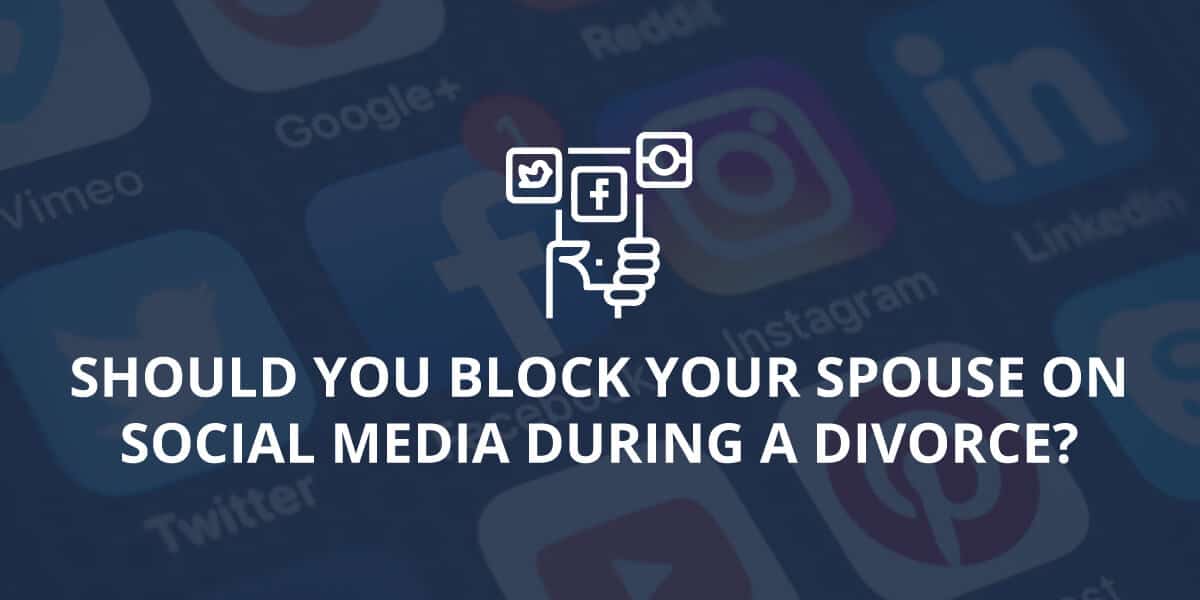Should I Block my Spouse on Social Media During a Divorce?

To preserve your privacy during a divorce, you may choose to unfriend, disconnect from, or block your spouse on social media. More importantly, you should tighten your privacy settings and not post anything on social media your spouse could use against you during the proceedings.
If you are going through a divorce or are preparing to file, talk with a Boston family law and divorce attorney at Infinity Law Group about what to do with your social media profiles. You can reach Infinity Law Group through our online form or by calling our Quincy, MA office at (617) 250-8236.
Social Media Can be Used as Evidence in Court
Social media may not impact your divorce at all. But it could if your spouse saw something concerning Facebook, Snapchat, Twitter, Instagram, Tik Tok, Pinterest, LinkedIn, WhatsApp, YouTube, Tinder, Bumble, or another social platform.
Social media content can be used as evidence during divorce proceedings if it adheres to the Rules of Evidence. Massachusetts provides an online guide to the Rules of Evidence, and you can speak to an attorney to learn more about when social media content may or may not be admitted to court.
The content is not automatically prohibited from court because it appeared online. Your spouse can use it if it is relevant to the proceedings, based on Section 401, and not excluded based on an evidentiary rule. Reasons to exclude social media evidence include possible unfair prejudice, confusion, undue delay, or a waste of time, outlined in Section 403.
How Social Media Can Impact a Divorce
Social media can impact a divorce when it raises a legitimate concern regarding marital finances, your mental or physical health, or your fitness to be a parent.
Social media posts regarding luxury vacations or purchases might concern your spouse. If your posts seem to show you spending a great deal of money, your spouse may investigate your shared finances further, including by hiring a forensic accountant. Your spouse could raise the issue of hidden assets or the intentional accumulation of debt in court.
Posts that raise questions about your finances could potentially impact the division of shared assets and debts, alimony, or child support.
Social media content that seems to depict you drinking frequently, using controlled substances, or partying might concern your co-parent. They might try to use this as evidence of alcoholism, drug abuse, or another mental health condition. If a judge is concerned about health or fitness as a parent, you may not receive the child custody or visitation you expected.
Be Careful with How You Use Social Media During a Divorce
When you are going through a trial separation or a divorce, you need to pay close attention to what you put on your social media profiles.
You should not discuss on social media:
- How the divorce is proceeding;
- Complaints about your spouse;
- Complaints about your spouse’s parenting;
- Complaints about a judge’s decision during a divorce;
- Financial difficulties, your spending, or shared assets or debts;
- Your alcohol or drug use; or
- Your social or romantic life.
You can continue to use social media to talk about the general aspects of your work, family, friendships, hobbies, and other interests. But you should stay away from any content that could reflect poorly on you, even in the most roundabout way.
Take Steps to Protect Your Privacy
The lengths to which you go to protect your privacy from your spouse during a divorce depend on your relationship. If you are going through a cordial, uncontested divorce, you might not feel blocking your spouse is necessary.
However, if you two are not on good terms, consider blocking them from all your accounts. When you are going through a contested divorce, your spouse may look for evidence against you wherever they can.
Consider talking with your relatives, friends, and social connections about maintaining your privacy. Ask them not to tag you in posts, photos, or videos. If they want to reach out, make sure they have a phone number or email to do so privately.
Update your privacy settings. As little of your information should be as public as possible.
Do not friend or connect with anyone new during the divorce. They may not be who the profile says they are. Unfriend or block anyone you are concerned with will snoop or report back to your spouse, including your spouse’s relatives and friends.
Do Not Delete Old Social Media Content
You should take steps to make your social media accounts more private. However, do not go through and delete your old content or questionable content.
Deleting anything from a single Tweet to a profile could look suspicious or like you are trying to hide relevant evidence. If the act is discovered by the divorce course, you could be sanctioned. It also might hurt your reputation with the judge.
Talk with a Boston Divorce Lawyer About Your Social Media Presence
If you use one or more social media profiles, talk with an experienced divorce attorney about how that content could affect your divorce. Also, think twice before starting a dating profile. More spouses and divorce attorneys are using Tinder, Bumble, and other social dating profiles as evidence in divorces.
Infinity Law Group has offices in Boston, Quincy, and Needham. To reach our main office in Quincy, MA, call (617) 250-8236. Or, use our online contact form to request your free initial consultation.
 Infinity Law Group LLC
Infinity Law Group LLC





